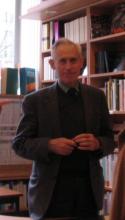What Is It
The question of what happens to us after we die remains as mysterious now as it always was. Some think that death amounts to total annihilation of the self; others adhere to certain religious traditions, which teach that the immaterial soul (and, in some traditions, the resurrected body) can ultimately survive death. So how are we to judge between these radically different views of what happens to us in death? What would it mean for the self to persist beyond the destruction of the body? Is there room in a scientific account of the mind for the existence of an immaterial soul? John and Ken see the light with Richard Swinburne from the University of Oxford, author of Mind, Brain, and Free Will.
Part of our series Visions of Immortality.
Listening Notes
“What’s next? Nothingness!” So claims John, but Ken isn’t so quick to agree. People have believed in the afterlife for thousands of years; it would be an odd claim to say they are wrong. But the conception of an afterlife is pure comfort, says John - people believe in the idea because they dislike the notion of death. Not all visions of the afterlife are comforting, though, says Ken, and surely if one starts out with the idea that there is no God, no soul, or anything the like, then the idea of an afterlife will sound preposterous. So, asks, John, what if there is an afterlife after all? What’s the basis for such a belief? Ken has never been there! But, Ken says, it’s not a matter of evidence – there is no evidence for belief in an afterlife or something else entirely as of today; rather, it’s a matter of faith. John might just have to be an agnostic on this matter. After some debate of reasonable and unreasonable expectations, John’s curiosity about what an afterlife might be like is spiked, and the pair decides to explore the topic further.
John and Ken introduce Richard Swinburne, Emeritus Professor of Philosophy at the University of Oxford and author of Mind, Brain, and Free Will. John asks Richard, who is a Christian, if there were ever times when he wasn’t sure there wasn’t an afterlife, or whether it was always obvious that there is life after death. Richard says there were no times when he was sure there was no afterlife, that the notion of an afterlife is part of the Christian religion and there are independent reasons for believing Christianity to be a true religion. John asks Richard why the belief in an afterlife is so prevalent among all sorts of people throughout history. Richard suggests wishful thinking might be an answer, but, more importantly, people are inclined to think that if there is no afterlife, what happens in this life is so insignificant that it does not matter if people do what is right, what is wrong. If people suffered or not would be inconsequential. There is also a prevalent notion that the good we do in life should in some way be rewarded and the bad punished. Humans, then, look for affirmation that specific actions matter, and Richard thinks this is a mistaken way of thinking; the logic in helping the poor is because they are poor; the logic in telling the truth because it is the truth and thus the right thing to tell. It is not because of some ulterior motive that one will be benefitted at some later point.
John, Ken, and Richard continue the discussion of the idea of an enduring self by welcoming audience participation. The main point the discussion centers on is Richard’s controversial proof of the soul, taking the example of identical twins whose brains are split and switched. They also respond to questions such as what the relationship between the mind and the soul is and why, instead of machinations about the afterlife, we don’t just listen to the near-death experiences that countless people have had.
- Roving Philosophical Report (Seek to 6:39): Shuka Kalantari walks us through a history of ideas of heaven, hell, and purgatory, from early Greek mythology to Plato to Woody Allen.
- 60-Second Philosopher (Seek to 46:04): Ian Shoales revives spirits with his lively monologue on the tension between believers and unbelievers and drives home punchlines from heaven.
